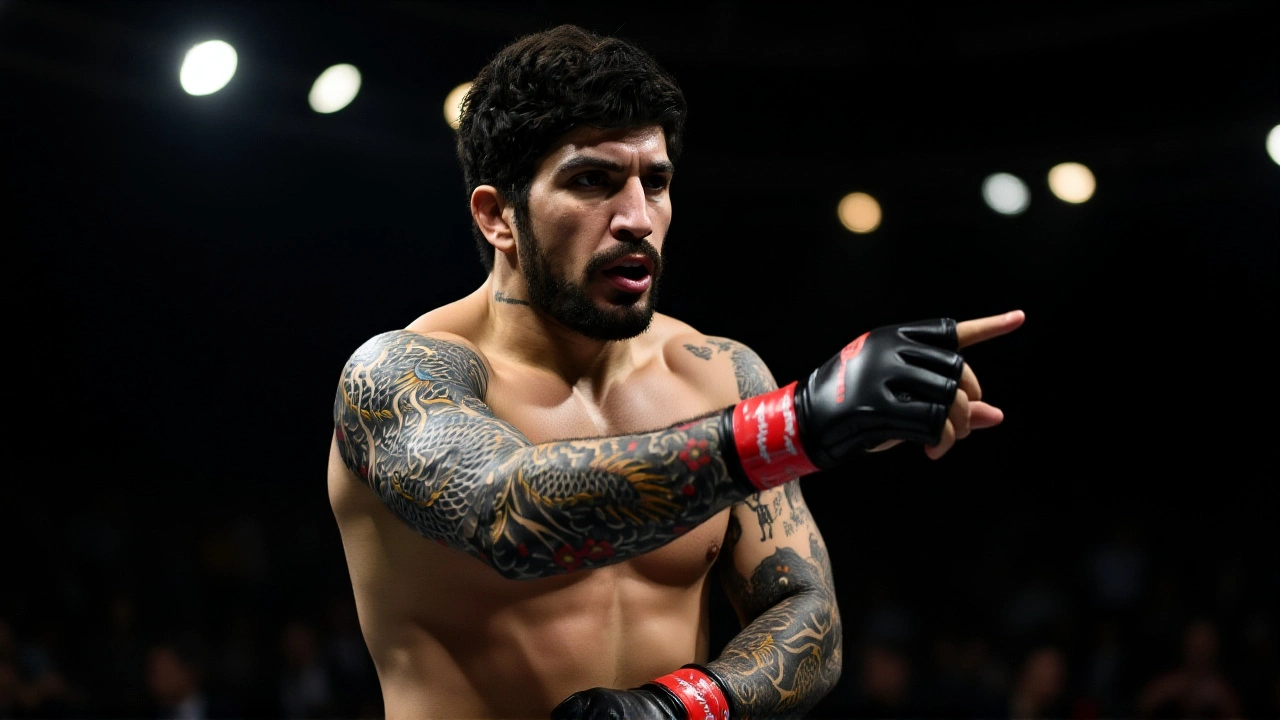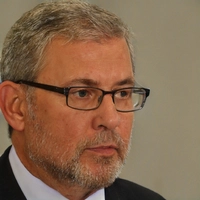It wasn’t a fight in the octagon. It was a flashpoint in the stands. On UFC 322New York City, just before the main card, Dillon Danis, a 31-year-old Canadian MMA fighter and former cornerman for Conor McGregor, sparked a physical confrontation with associates of Islam Makhachev, the reigning UFC Lightweight Champion. Security spotted Danis sitting in fighter-designated seats — not his assigned spectator spot — despite holding a valid ticket. They asked UFC President Dana White if they should eject him. White said no. "He has a ticket," he recalled telling them. And then, minutes later, chaos erupted.
"I Blame Myself"
At the post-fight press conference, White didn’t deflect. He didn’t blame security. He didn’t point fingers at Makhachev’s team. He took it all. "I blame myself for that," he said, voice heavy with regret. "They came back and told me right before I walked out... Dylan Danis was here, moving around, sitting in fighter seats." He paused. "I knew exactly what that was. I knew it."
That moment — the decision not to remove Danis — became the hinge on which the entire night turned. Danis, known for his provocations and combative persona, had long been a lightning rod. His history with the Nurmagomedov camp goes back to UFC 229Las Vegas, where he threw a water bottle at Khabib Nurmagomedov after his fight with McGregor. That incident cost multiple fighters suspensions. Danis never forgot it. Neither did the Nurmagomedov camp.
A Pattern of Provocation
Danis isn’t just a fighter. He’s a provocateur. He’s competed in Bellator MMA, but his real notoriety comes from social media taunts, confrontations at weigh-ins, and his refusal to stay in his lane. He wanted into the UFC. Badly. But White and the organization had always said no — not because of his skill, but because of his reputation. "He’s been wanting badly to come in this company," White said. "He said you guys don’t want to sign him because he makes too much trouble. Well, point made."
That line — "makes too much trouble" — wasn’t just a throwaway comment. It was the reason Danis never got a contract. It was the reason the UFC kept him at arm’s length for years. And now, it was the reason he’d never set foot in another UFC arena. Not as a fighter. Not as a cornerman. Not even as a fan.

The Ban: Absolute, Immediate, Global
White didn’t say "suspension." He didn’t say "probation." He didn’t say "next time." He said: "You will never see Dillon Danis at a UFC fight ever again." The words were clear. Final. Unambiguous. The ban took effect immediately on November 16, 2025, and covers every UFC event worldwide — from Las Vegas to Abu Dhabi, from London to Singapore. No exceptions. No appeals.
Notably, the UFC announced it would not press charges. White confirmed it: "We’re not pressing charges against anybody." That’s unusual. Most physical altercations involving spectators — especially those escalating to punches or shoves — trigger police involvement. But the UFC, for all its theatrics, prefers to police its own. Internal discipline. No courtrooms. No headlines beyond the MMA press. It’s a calculated move: contain the damage, protect the brand, avoid the legal quagmire.
Why This Matters
This isn’t just about one guy who got too close to the wrong people. It’s about the limits of chaos in a billion-dollar sport. The UFC thrives on drama — but only when it’s choreographed. When it’s controlled. When it’s part of the story they’re selling. Danis wasn’t part of that story. He was a wild card. A variable they couldn’t predict. And now, they’ve removed him from the board.
For fighters like Makhachev and his team — who’ve spent years trying to stay above the fray — this ban is a quiet victory. They’ve been the model professionals: disciplined, focused, quiet. Danis was the opposite. And in a sport where image is everything, the UFC chose the calm over the chaos. The champion over the agitator.

What’s Next?
Danis’s career path is now narrow. He can still fight in Bellator, or smaller regional promotions. He can still post videos online. He can still rant on Twitter. But he’ll never be part of the UFC’s ecosystem. Not as a fighter. Not as a coach. Not even as a spectator. The door isn’t just closed — it’s welded shut.
And for White? He’s got a tough balance ahead. The UFC needs personalities. It needs fighters who draw attention. But it also needs control. Danis was the worst kind of attention: unpredictable, uncontrollable, and dangerous to the brand. His ban sends a message: You can be loud. You can be edgy. But if you cross the line, you’re gone. Forever.
Frequently Asked Questions
Why didn’t the UFC press charges against Dillon Danis?
The UFC opted for internal discipline over legal action to avoid prolonged media scrutiny and potential lawsuits. While the brawl involved physical contact, the organization prefers handling conduct issues internally to maintain control over the narrative. White confirmed the decision publicly, emphasizing that the ban itself was punishment enough.
How does this ban affect Danis’s chances of ever fighting in the UFC?
It ends them completely. Dana White made it clear Danis will never compete in the UFC, not even as a replacement or alternate. His history of inciting conflict, including the UFC 229 incident and repeated provocations, made him a liability. The ban is absolute — no contract, no guest pass, no backstage access. His path to the octagon is permanently closed.
What role did Dana White play in enabling the brawl?
White admitted he had the chance to remove Danis before the incident but chose not to, saying, "He has a ticket." That decision, while legally defensible, ignored the known risk: Danis’s history of escalating tensions with the Nurmagomedov camp. White’s later regret suggests he underestimated how volatile the situation was — and now, he’s paying the price with a permanent stain on his legacy.
Is this ban related to Danis’s past with Conor McGregor?
Yes, indirectly. Danis gained notoriety as McGregor’s cornerman during UFC 229, where he helped fuel the post-fight melee. Even after their professional split, Danis continued to publicly antagonize the Nurmagomedov camp. The UFC viewed him as an extension of that chaos — and McGregor’s own turbulent history made Danis a double liability. White’s ban is less about the brawl and more about decades of accumulated friction.
Could Danis return if he changes his behavior?
No. White’s language was absolute: "You will never see Dillon Danis at a UFC fight ever again." There’s no mention of probation, rehabilitation, or conditional reinstatement. In the UFC’s world, this is a death sentence for Danis’s association with the organization. Even if he apologized tomorrow, the ban is final.
How does this compare to other UFC bans?
Most UFC bans are temporary — usually for fighter misconduct like failed drug tests or post-fight violence. Permanent bans are rare and typically reserved for extreme cases like violence against staff or threats. Danis’s case is unique: he’s a spectator, not a fighter, yet he received the harshest penalty possible. It signals the UFC is now willing to protect its environment at all costs — even if it means ejecting someone who never stepped into the octagon.
